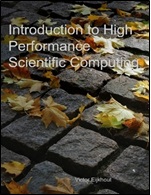
|
FreeComputerBooks.com
Links to Free Computer, Mathematics, Technical Books all over the World
|
|
- Title Introduction to High-Performance Scientific Computing
- Author(s) Victor Eijkhout
- Publisher: lulu.com (2015); eBook (Evolving Copy, Creative Commons Licensed, 2023)
- License(s): Commons Attribution 3.0 Unported (CC BY 3.0)
- Paperback: 534 pages
- eBook PDF (553 pages, 54.5 MB)
- Language: English
- ISBN-10: 1257992546
- ISBN-13: 978-1257992546
- Share This:

|
This is a textbook that teaches the bridging topics between numerical analysis, parallel computing, code performance, large scale applications.
Designed for undergraduates, it assumes a basic knowledge of numerical computation and proficiency in Fortran or C programming and can be used in any science, computer science, applied mathematics, or engineering department or by practicing scientists and engineers, especially those associated with one of the national laboratories or supercomputer centers.
The contents of this book is a combination of theoretical material and selfguided tutorials on various practical skills. The theory chapters have exercises that can be assigned in a classroom, however, their placement in the text is such that a reader not inclined to do exercises can simply take them as statement of fact.
About the Authors- Victor Eijkhout is a research scientist at the Texas Advanced Computing Center.
- Numerical Analysis and Scientific Computing
- Parallel Computing and Programming
- The C and Objective C Programming
- Fortran Programming Language

- Introduction to High-Performance Scientific Computing (Victor Eijkhout)
- The Mirror Site (1) - PDF
- The Mirror Site (2) - PDF
-
 Scientific Programming in C++17 and Fortran 2008 (V. Eijkhout)
Scientific Programming in C++17 and Fortran 2008 (V. Eijkhout)
This book covers the two major high performance languages: C++17 and Fortran 2008. Both are covered from the ground up, rather than encyclopedically, with plenty of programming examples, taken from computational science.
-
 Introduction to Scientific Programming with Python
Introduction to Scientific Programming with Python
This book offers an initial introduction to programming for scientific and computational applications using the Python programming language. The presentation style is compact and example-based, assuming little or no prior experience in programming.
-
 Architecture of Advanced Numerical Analysis Systems
Architecture of Advanced Numerical Analysis Systems
This unique open access book applies the functional OCaml programming language to numerical or computational weighted data science, engineering, and scientific applications. It's based on Owl, an OCaml-based numerical computing library.
-
 High Performance Computing and Numerical Modelling
High Performance Computing and Numerical Modelling
This textbook provides a step-by-step approach to numerical methods in engineering modelling. It provides a consistent treatment of the topic, from the ground up, to reinforce for students that numerical methods are a set of mathematical modelling tools.
-
 High Performance Embedded Computing (Luis M. Pinho, et al.)
High Performance Embedded Computing (Luis M. Pinho, et al.)
This book presents recent advances in software architecture and tools to support such complex systems, enabling the design of embedded computing devices which are able to deliver high-performance whilst guaranteeing the application required timing bounds.
-
 High Performance Computing For Dummies, Sun & AMD Edition
High Performance Computing For Dummies, Sun & AMD Edition
This book is intended for anyone who has heard about the many benefits of using HPC (such as streamlining processes or saving money). This book explains what HPC is and shows how it can help you or others within your company.
-
 Is Parallel Programming Hard? If So, What Can You Do About It?
Is Parallel Programming Hard? If So, What Can You Do About It?
It examines what makes parallel programming hard, and describes design techniques that can help you avoid many parallel-programming pitfalls. It is primarily intended for low-level C/C++ code, but offers valuable lessons for other environments as well.
-
 Data Parallel C++: Mastering DPC++ Programming
Data Parallel C++: Mastering DPC++ Programming
Learn how to accelerate C++ programs using Data Parallelism. This book enables C++ programmers to be at the forefront of this exciting and important new development that is helping to push computing to new levels.
-
 Pro TBB: C++ Parallel Programming with Threading Building Blocks
Pro TBB: C++ Parallel Programming with Threading Building Blocks
This book is a modern guide for all C++ programmers to learn Threading Building Blocks (TBB). It presents numerous examples and best practices to help you become an effective TBB programmer and leverage the power of parallel systems.
-
 Introduction to Parallel Computing (Blaise Barney)
Introduction to Parallel Computing (Blaise Barney)
This book explains how to design, debug, and evaluate the performance of distributed and shared-memory programs. It teaches students how to compile, run and modify example programs. It is a complete end-to-end source of information on almost all aspects.
-
 Parallel Programming in MPI and OpenMP (Victor Eijkhout)
Parallel Programming in MPI and OpenMP (Victor Eijkhout)
This is a textbook about parallel programming of scientific application on large computers, learn how to design, analyze, implement, and benchmark parallel programs in C/C++ and Fortran using MPI and/or OpenMP.
-
 The Practice of Parallel Programming (Sergey A. Babkin)
The Practice of Parallel Programming (Sergey A. Babkin)
This book provides an advanced guide to the issues of the parallel and multithreaded programming. It goes beyond the high-level design of the applications, into the details that are often overlooked but vital to make the programs work.





